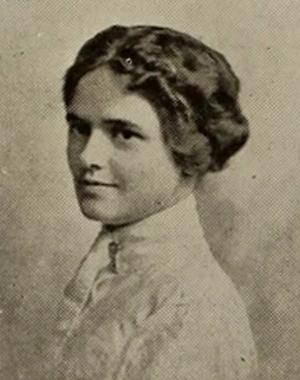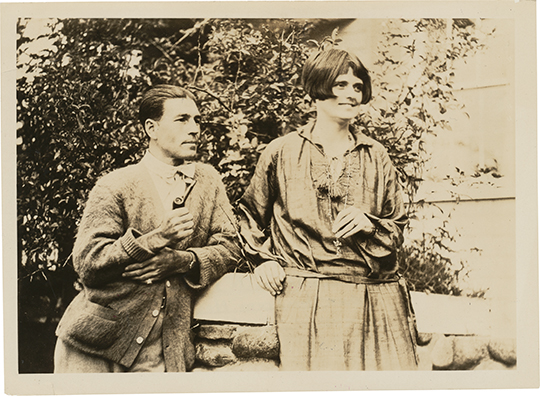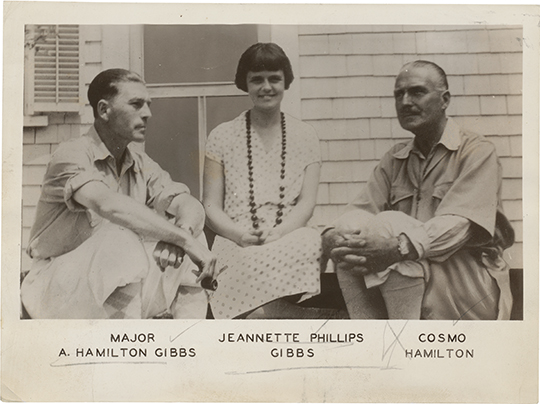putterings 401 < 402 > 403 index
of course
all her degree, Margaret’s ignorance of any of them was abysmal. ... He played golf, but Margaret’s game was so poor that when he took time off from the office it was no fun puttering around with her... Of course, she was completely in love with him, and when he felt like love-making it was only to her that he made love. She might be lonely sometimes and feel neglected, but she could trust him and...
ex Jeannette Phillips Gibbs, Humdrum House (1929) : 21

second landing (search for “puttering” + “phillips”) : link
—
not available online (at present), some contemporary reviews below :
- Gibbs, Jeannette. Humdrum house.
Margaret Underhill, an apparently happy woman, with husband, children, home, and friends, suddenly finds all her life intolerably dull and meaningless. She decides to live for a period in New York, till she can bring new purpose into her life and revitalize her relations with her husband and children.
— Among Our Books / A Selected List of New Books in the Carnegie Library of Pittsburgh, 34:4 (April 1929) : 31 : (pdf) - “Humdrum House” by Jeanette [sic] Gibbs. A keen portrayal of present-day married life where a husband is engrossed in his business, and a wife’s interest is centered in her domestic duties, and small town gossip. The awakening for both comes with the doctrine of “self-expression and a broader life.”
— “Library Notes,” The Kodak Magazine 9:12 (May 1929) : 31 : link (pdf)
![]()
Jeannette Phillips Gibbs (1892-1969)
- Smith College, Class of 1913 (where Jennette Lee was teaching English at the time)

Jeannette Clarke Phillips
Hotel Bellevue, Boston, Mass. : link - Boston University, Law (1917)
- later photos

press photo, N.E.A. Dec 16 1934 MAG.
Major A. Hamilton Gibbs, author of “Harness” 10/6/28 and Mrs. Jeannette Phillips Gibbs, Author of “Humdrum House” 1/26/29, Little, Brown & Co., Publishers, Boston
press photo, N.E.A. Dec 16 1934 MAG.
written (in pencil) on back : Gibbs (left) his wife & brother

four published novels, that in addition to Humdrum House included :
- Portia Marries (1926) : link
“The wife of A. Hamilton Gibbs tells what happens when a successful woman lawyer marries a successful business man” (publisher’s blurb)substantial review of the novel by Rebecca Hourwich (1897-1987 *) in the feminist periodical Equal Rights 13:36 (October 23, 1926) : 295 : link
another (less favorable) review (by Berenice C. Skidelsky) appeared in Vogue 68:8 (October 15, 1926) : 116 : link
Another Gibbs enters the novel-writing field. This time, it is Jeannette Phillips Gibbs, in private life Mrs. A. Hamilton Gibbs, and thereby wife of one novelist and sister-in-law to two others. Her vehicle is “PORTIA MARRIES” (Little, Brown), and it is, in effect, a brief in defence of the married professional woman. Since Mrs. Gibbs herself is a lawyer, she places her heroine, as the title implies, in the profession where she herself is most sure of her ground. The larger first part of the book deals with the struggles of the married woman lawyer to continue her profession in the face of the protests of her husband, family, and friends; it is a situation wearisome to us of this generation, threshed out as it has been so many times that a reiteration can not but try the patience to the breaking point. The latter part is a triumphant vindication of her perserverance in the face of all obstacles, through the acknowledgment by her husband, family, and friends that her life, and incidentally theirs, has been all the richer for her triple rôle of wife, mother, and individual.
The trouble with the thesis novel is the immense significance that timeliness plays both in its interest and its value. At the birth of the century, this book might even have caused wide-spread discussion; to-day, it seems a little antiquated for its author’s ardour, and thereby a little absurd. As a story, it may “get by” with some readers, though it has little originality and no marked colour.Portia Marries — and its lawyer author — are also treated in Virginia G. Drachman, Sisters in Law : Women Lawyers in Modern American History (1998) : 195-199
borrowable via archive.org : link (opens to pp 195-196) - French Leave (1930)
“Jeannette Phillips Gibbs takes a long step in this third novel of hers, both geographically and artistically. ¶ It is a story woven around the Bohemian life in the studios of Paris, wherein Charles Clayton, an American, born and brought up in a small western town, becomes more Parisian than the Parisians themselves. ¶ Charles is a unique character, both selfish and charming, and the book is made amusing by his quaint and most unconventional philosophy. The thousand and one problems which arise as a result of his love for the daughter of a rich American tourist, although he has a wife back in America, who with their son has lived apart from him for many years because she cannot understand his unconventional ideas of living, make up the theme of this most interesting novel. ¶ In the portrayal of her characters, in the painting of her background, and in the treatment of this universal situation, Mrs. Gibbs shows herself to be a true artist.”
— review in “Scarlet and White Book Shelf,” Bostonia : The Boston University Alumni Magazine 4:10 (March 1931) : 20 : link - Copy for Mother (1934)
reviewed in The New York Times (March 11, 1934) : link (paywall)
“a knowing study of a woman novelist whose husband and daughter, friends and admirers were all so much grist for her work...”

humorous verse — all of these (published in Life in 1919) have a kind of dialectical or adversarial quality, that is, a situation seen from two perspectives, that might relate to their author’s legal training and/or legalistic mind. —
- “Alma Mater Revisited”
Life Vol. 74, No. 1920 (April 14, 1919) : 278 : link (google books)The young wife, class ’17,
Hands her husband around
Like a new Kewpie doll
to Peggy, Helen, Margaret,
Excited, all prinked up,
Reminiscing like a nestful of rooks;
Proud, eager, forgetful,
Dashing from room to hall,
From hall to Alumnae,
From chocolate shake to strawberry sundae,
Tossing her husband one smile carelessly,
Like a bone to a starving dog.
The young husband
Among the billowing frocks
of Peggy, Hellen, Margaret,
Excited, all prinked up
Like new Kewpie dolls,
Limps in tight boots adoringly
From room to hall,
From hall to Alumnae,
Alone,
Seeing one excited face
in the mass of muslined nullities,
Poised to catch the careless smile
For which he hungers,
Like a starving dog. - “Surf Bathing”
Life Vol. 74, No. 1917 (July 24, 1919) : 164 : link (google books)He, with burnt face, arms and legs,
The joy of life sparkling in his eyes
As he emerges from a huge wave,
Blowing like a grampus
With a crab fastened to his great toe:
“Look at that darling in orange and black!
Like a delicate tulip.
If a big sea hit her she’d break.
Wonder whether I could lure her to get wet,
And do a rescue stunt?”
She, in satin bathing costume and black silk stockings,
The joy of life sparking in her eyes
As she dashes back with a squeal
From the ripple that might wet her ankles
And spoil her appearance for the morning :
“Look at that handsome great thing!
Like a Hercules.
If he put his arms around me I’d break.
Wonder whether I’ll ruin my costume
And pretend to get drowned?” - “Fact and Fiction”
Life Vol. 74, No. 1917 (July 24, 1919) : 174 : link (google books)The editor at the breakfast-table,
Irritable and overbearing.
His wife opposite, nervous and worried.
He tastes his coffee and pushes it aside.
“This whole breakfast is kennel-food!” he ejaculates.
“Dearest,” his wife answers meekly.
“I’ll discharge the cook and find someone else.
I want nothing more in this world
Than to have you satisfied.”
“No sentimental rot!
That doesn’t go down.
What I want is a decently run house.”
The editor at the office,
Irritable and overbearing.
The young author opposite, nervous and worried.
He glances at the manuscript and pushes it aside.
“This whole idea is bunk!” he said.
“Sir,” the young author answers meekly,
“I’ll throw it away and write another.
I want you to be satisfied.
That is my ambition.”
“No idealistic, morbid theories, then,
They don’t go down.
What I want is love stories with a happy ending!” - “The Picnic”
Life Vol. 74, No. 1918 (July 31, 1919) : 189 : link (google books)From his point of view :
A strong breeze
Bringing peace to his heart.
A green carpet of grass
Like velvet cushions, where he sat.
The rustling of leaves and the song of birds
Like a fairy orchestra.
The lunch spread on a white cloth
Tempting his appetite;
The sun shining brightly,
Filling his soul with warmth and joy;
The girl, a golden-haired sprite,
Making the day with all its glories
Perfect.
From her point of view :
A strong breeze
Disarranging her hair.
A green carpet of grass
Where she sat in fear of stains upon her skirt.
The rustling of leaves and the song of birds,
The hum of mosquitoes biting her,
Like a fairy orchestra.
The lunch spread on a white cloth
With ants marching over the food;
The sun shining brightly,
Scorching her neck and arms;
The man lying there smoking
Making the day with all its discomforts
Possible. - “How They Talk About Each Other”
Life Vol. 74, No. 1919, the “Anti-Everything Number” (August 7, 1919) : 245 : link (google books)In the drawing-room they say
That the cook is fat, lazy and ill-tempered,
With absurd airs, independent;
That the waitress is flighty, impertinent,
And thinks of nothing but beaux;
That the chauffeur speeds when he drives
And drinks when he is not speeding —
Really a worthless fellow.
In the kitchen they say
That the mistress is fat, lazy and ill-tempered,
With absurd airs, independent;
That the daughter is flighty, impertinent,
And thinks of nothing but beaux;
That the son speeds when he drives
And drinks when he is not speeding —
Really a worthless fellow. - “Gardens and Cities”
Life Vol. 74, No. 1923 (September 4, 1919) : 426 : link (google books)I walked about a large garden
Among thousands of flowers,
And only rarely did I find an ugly or misshapen one.
“How many flowers did God put into this world?” I said.
I walked about a large city
Among thousands of my fellow-men,
And only rarely did I find a clear and straightforward soul.
“How many men did God put into this world?” I cried . . .
“I am thankful that there are more flowers than men.” - “Treasures”
Life Vol. 74, No. 1936 (December 4, 1919) : 936 : link (google books)The host showed his guest his most valued possession,
His pride and triumph,
The one thing he had
Which was rare and coveted.
He told of the difficulty of getting it,
Of finding the proper waters,
Of securing just the right bait,
Of obtaining the right weather conditions,
Of the skill needed to land him.
It was a fish on the wall, recently mounted.
Both men were sportsmen.
The guest was consumed with envy.
The hostess showed her guest her most valued possession,
Her pride and triumph,
The one thing she had
Which was rare and coveted.
She told of the difficulty of getting it,
Of finding the proper place to search,
Of securing just the right bait,
Of obtaining the right conditions,
Of the skill needed to land her.
It was a cook, in the kitchen, recently hired.
Both women were housekeepers.
The guest was consumed with envy.

public policy discussions
- “Our All-American Aliens”
an essay regarding the citizenship status of American women, who marry citizens of other countries and thereby gave up their U.S. citizenship; the issue would be addressed by the Cable Act of 1922, and subsequent adjustments (wikipedia : link)
The New York Times (February 26, 1922) : link (paywall) - “Lecture Suspects”
a satirical piece on ejection of arrivals at Ellis Island who had the intention of “lecturing” in the country
The New York Times (September 24, 1922) : link (paywall)

a series on legal and financial affairs, that ran in Vogue ca 1923-25; I have not looked through (all of) 1926, but suspect the last of these ran in December 1925.
- “The Woman Investor” (1)
mainly devoted to bonds
Vogue 61:11 (June 1, 1923) : 104, 106, 108 : link - “New Wedding Rings for Old” (2)
on divorce and 48 divorce laws, in 48 states; need for reform; concludes with reference to legislation proposed by Senator Capper of Ohio that would enable uniform laws covering marriage and divorce [with an aim to discourage hasty divorces and marriages * ]
Vogue 62:6 (September 15, 1923) : 126, 128, 134 : link - “Making a Will” (3)
Vogue 62:7 (October 1, 1923) : 116, 118, 120 : link - “What About Mortgages?” (4)
Vogue 62:9 (November 1, 1923) : 126, 128, 130 : link - “Are You Insured?” (5)
Vogue 63:4 (November 1, 1923) : 106, 110, 114 : link - “Left in Trust” (6)
Vogue 63:8 (April 15, 1925) : 122, 128, 130 : link - “Considering the Cheque” (7)
Vogue 64:6 (September 15, 1924) : 156, 158 : link - “Banking for Beginners” (8)
Vogue 64:7 (October 1, 1924) : 104, 134, 138 : link - “Insurance Trusts” (9)
Vogue 64:8 (October 15, 1924) : 108, 110 : link - “Procedure in the Small Club : Parliamentary rules that are essential in any organization” (unnumbered, but tenth in series)
Vogue 65:6 (March 15, 1925) : 176, 178 : link - “The Party of the First Part,” (unnumbered, but 11th in series)
on contracts... “The thorn in feminine flesh; we now come to the phrase, competent parties”
Vogue 66:11 (December 1, 1925) : 164, 166 : link

- married A. Hamilton Gibbs (1888-1964), an English writer who became U.S. citizen in 1931
wikipedia : link
obituary (of A. Hamilton) in The New York Times (May 26, 1964) : link (paywall) - Jeannette Phillips Gibbs, Lakeville, Massachusetts, “The French Influence on the Writings of A. Hamilton Gibbs,” in Herbert H. Golden, ed., Studies in Honor of Samuel Montefiore Waxman (Boston University Press, 1969) : 51-55
borrowable at archive.org : link - “Marrying the Muse,” The Independent (September 24, 1927) : 303-306
opens to page 305, link (U California copy/scan, hathitrust)
captioned “Mr. and Mrs. Hamilton Gibbs are the authors of ‘Labels’ and ‘Portia Marries,’ respectively. Mrs. Gibbs is a member of the New York and Boston bars, perhaps half the reason that she has not written so many books as her husband.”